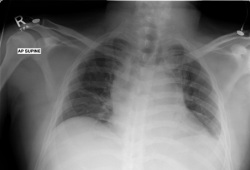Resumo
Definição
História e exame físico
Principais fatores diagnósticos
- lymphadenopathy
Outros fatores diagnósticos
- unexplained fevers
- night sweats
- weight loss
- dyspnea
- cough
- chest pain
- superior vena cava syndrome (SVCS)
- abdominal pain
- pruritus
- alcohol-induced pain at involved sites
- hepatomegaly and/or splenomegaly
- tonsillar enlargement
Fatores de risco
- age 20-34 years and >55 years
- history of Epstein-Barr virus (EBV) infection
- family history of Hodgkin lymphoma
- young adults from higher socioeconomic class
- human leukocyte antigen (HLA) types
- Jewish ancestry
Investigações diagnósticas
Primeiras investigações a serem solicitadas
- CBC with differential
- comprehensive metabolic panel
- erythrocyte sedimentation rate (ESR)
- thyroid function tests
- screening for HIV, hepatitis B, hepatitis C
- CXR
- PET/CT scan
- contrast-enhanced CT (neck, chest, abdomen, pelvis)
- excisional lymph node biopsy or core biopsy
- immunohistochemical studies
Investigações a serem consideradas
- bone marrow biopsy
- echocardiogram or multigated acquisition (MUGA) scan
- pulmonary function tests
Algoritmo de tratamento
early (stage I to II) classical HL: favorable disease and intended for combined-modality therapy
early (stage I to II) classical HL: favorable disease and intended for chemotherapy alone
early (stage I to II) classical HL: unfavorable disease (non-bulky or bulky) and intended for combined-modality therapy
early (stage I to II) classical HL: unfavorable disease (non-bulky) and intended for chemotherapy alone
early (stage I to II) classical HL: unfavorable disease (bulky) and intended for chemotherapy alone
early (stage I to II) classical HL: unfavorable disease and intended for alternative induction therapy
advanced (stage III to IV) classical HL: intended for intensive induction chemotherapy
advanced (stage III to IV) classical HL: intended for standard induction therapy (chemoimmunotherapy)
advanced (stage III to IV) classical HL: intended for standard induction therapy (chemotherapy)
asymptomatic early (stage IA to IIA) NLPHL, non-bulky disease
asymptomatic early (stage IA to IIA) NLPHL, bulky disease; and symptomatic early (stage IB to IIB) NLPHL
advanced (stage III to IV) NLPHL
refractory or relapsed classical HL
refractory or relapsed NLPHL
Colaboradores
Autores
Alison Moskowitz, MD
Associate Attending
Lymphoma Service
Memorial Sloan-Kettering Cancer Center
New York City
NY
Declarações
AM has received research support from ADC Therapeutics, Beigene, Miragen, Seattle Genetics, Merck, Bristol-Myers Squibb, Incyte, and SecuraBio. AM has received honoraria from Seagen, Affimed, Astra Zeneca, Bio Ascend, Imbrium Therapeutics L.P./Purdue, Janpix Ltd., Merck, Seattle Genetics, Pfizer, Tessa Therapeutics and Takeda. AM is an author of several references cited in this topic.
Agradecimentos
Dr Alison Moskowitz would like to gratefully acknowledge Dr Chris R. Kelsey, Dr Leonard R. Prosnitz, and Dr Timothy M. Zagar, the previous contributors to this topic.
Declarações
CRK, LRP, and TMZ declare that they have no competing interests.
Revisores
Snegha Ananth, MBBS
Assistant Professor
Division of Oncology & Hematology
University of Nebraska Medical Center
Omaha
NE
Declarações
SA declares that she has no competing interests.
Christopher D'Angelo, MD
Assistant Professor
Division of Oncology & Hematology
University of Nebraska Medical Center
Omaha
NE
Declarações
CDA declares that he has received consulting fees from Abbvie, Beigene, Genmab, Curis Inc, Bristol Myers Squibb.
Créditos aos pareceristas
Os tópicos do BMJ Best Practice são constantemente atualizados, seguindo os desenvolvimentos das evidências e das diretrizes. Os pareceristas aqui listados revisaram o conteúdo pelo menos uma vez durante a história do tópico.
Declarações
As afiliações e declarações dos pareceristas referem--se ao momento da revisão.
Referências
Principais artigos
Cheson BD, Fisher RI, Barrington SF, et al. Recommendations for initial evaluation, staging, and response assessment of Hodgkin and non-Hodgkin lymphoma: the Lugano classification. J Clin Oncol. 2014 Sep 20;32(27):3059-68.Texto completo Resumo
National Comprehensive Cancer Network. NCCN clinical practice guidelines in oncology: Hodgkin lymphoma [internet publication].Texto completo
Eyre TA, Cwynarski K, d'Amore F, et al. Lymphomas: ESMO clinical practice guideline for diagnosis, treatment and follow-up. Ann Oncol. 1 Aug 2025: S0923-7534(25)00911-1.Texto completo Resumo
Artigos de referência
Uma lista completa das fontes referenciadas neste tópico está disponível para os usuários com acesso total ao BMJ Best Practice.

Diagnósticos diferenciais
- Non-Hodgkin lymphoma (NHL)
- Lymphadenopathy from other malignancies
- Infectious mononucleosis
Mais Diagnósticos diferenciaisDiretrizes
- NCCN clinical practice guidelines in oncology: Hodgkin lymphoma
- Lymphomas: ESMO clinical practice guideline for diagnosis, treatment and follow-up
Mais DiretrizesConectar-se ou assinar para acessar todo o BMJ Best Practice
O uso deste conteúdo está sujeito ao nosso aviso legal